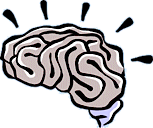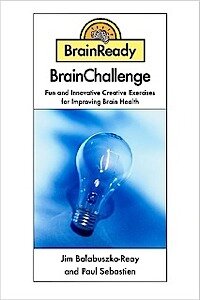
How many of us find ourselves sticking to our daily and weekly routines: going through the same basic actions, tasks, places and times most days of the week?
Or are those routines more like ruts, albeit comfortable and familiar ones? Ah, but routines are GOOD we think: they’re derived out of long-learned efficiencies, what we like and don’t like, what seems to work best and not work best. Why mess around and take a risk on doing things differently when there’s a chance that we won’t like it, or derive benefit from it?
Well, there’s a very compelling reason to toss things up: your mental health. Especially as you get older. It's even important if you’re quite young, but truly critical as you get older.
Those of you who have heard our “Do it Different Challenge” segment in a few of our BrainReady BrainCast audio brain exercise episodes may already know that doing even very simple, routine tasks differently – such as brushing your teeth with your other hand, getting dressed or hanging up your clothes with your eyes closed, reading a book or magazine turned upside down, and so on, exercises your brain...as it’s forced to activate & exercise previously little-used areas (or combinations of areas) of your brain into action. It’s similar to doing a physical exercise that you don’t normally do, forcing previously little-used muscles to wake up, activate, rebuild and (perhaps most importantly) prepare for future expected use.
This is why it’s now conventional wisdom that such intellectual pursuits as learning a new language, learning a new mental skill or area of expertise are so beneficial to our mental health.
But you may not know that there are some other (and even easier!) things you can do which can provide equal or even GREATER age and rut-busting brain benefits – benefits which apply to not only your brain’s overall power, adaptability, speed and sharpness, but to your overall quality of life.
Now if that doesn’t motivate you to bust out of your rut a little bit, the ease of incorporating some of the following tips into your life probably will…

Experience it: new intellectual challenges and pursuits are wonderful for your brain in all regards…but experiential ones can engage for more of your whole brain, utilizing all of your senses together. Here are some examples of easy & fun experiential “Do It Different Challenges” that almost anyone can do:
• Make a completely new, unfamiliar meal or food from scratch in your kitchen: perhaps it’s Indian food, Sushi, a traditional American meal, a regional bread or sauce, even brewing your own beer or wine. This will awaken multiple mental, tactile, mechanical, and…yes, taste & smell areas into action. And you’ll get to enjoy the results!

• Travel to a new, unfamiliar place! Now, before you say “I don’t have time or money” or “I’m too old” or other knee-jerk reactions that many of us say as a defense mechanism (defending our unfairly-annointed Comfort Zone of Familiarity), realize that almost ANYONE can find a way to travel, and the act of finding those creative ways to deal with the blockers is part of the brain exercise! Travel to a new unfamiliar place, ideally to a different culture and area where everything from the food to your surroundings to the local customs are different from your own, is a truly incredible (and sustained, as you’re immersed in it for days) awakening workout for your brain and overall mental health. Ever notice that odd feeling of new-ness and euphoria that you get after coming home from a trip, where your familiar surrounding feel somehow new and different and you even look at your life in a new light? Exactly…

• Try a new sport of physical exercise: not only will this challenge your brain and motor-neuron skills, but the physical exercise itself is also incredible for your brain health! It’s a win-win. And no, you’re not too old or busy: almost anyone can try to pick up ping-pong/table tennis, real tennis, swimming, bike riding, surfing, skiing.
• Juggling: yes, juggling! Believe it or not, learning to juggle is an incredible brain exercise that’s not unlike learning an entirely new vocational skill. It will also keep your motor-neuron connections sharp, arms and hands and eyes agile, speed and concentration in top form. No excuses on this one, even if you try and try and just can’t get it! The act of trying is what counts (Yoda is wrong, here).
• Take a class on a completely unfamiliar subject. It’s easier than it sounds: most local community colleges offer inexpensive classes on topics ranging to Buddhism to basket weaving to Business Law. The new learning will be great, but the experiential part comes into play during the classroom interactions with other students (discussions, interactions, social experiences), the travel to and from class (a new place, new people, new smells, everything) and even the resulting things you might do with those you meet in the class such as going for coffee to a new place after the class. All GREAT for tossing it up and getting your brain back into action!
• Get a Nintendo Wii video game machine. Nope, we’re not kidding: particularly if you’re not already a video gamer, this can be one heck of a great experiential workout for your brain: learning how to use the new machine and games, getting progressively better at playing the games, improving your hand-eye and body coordination (thanks to the Wii’s unique controller which forces you to move PHYSICALLY to play the games, not just click buttons and move knobs!) – all work together synergistically to give your brain a completely new, unfamiliar experience. Stop right the, we know what you’re thinking: people will think I’m weird or crazy if they see me playing Nintendo Wii video games in my house! Nonsense. In sharp contrast to watching TV or movies, playing video games is actually incredibly mentally stimulating. We challenge anyone of any age to pick up that Nintendo Wii controller and try their bowling or tennis or trivia games and not get addicted. Invite those skeptical friends over and play with them! It becomes a social event, which in turn provides even further benefits to your brain and mental health (especially as you get older). Buy the Wii now, and an extra controller for your spouse or family member or friend.

• Go out for dinner with a friend or acquaintance that you have never gone out with before, or in a long time, and go to a restaurant that you’ve never been to…ideally in an unfamiliar location, with unfamiliar cuisine. An example might be that Ethiopian restaurant in the part of the city that you haven’t been to much, with your acquaintance Carol who know but haven’t ever been out to dinner with. Yes, this seemingly simple endeavor will exercise your brain on a myriad levels: navigating to the restaurant, arranging the dinner with your acquaintance, eating/smelling/tasting the unfamiliar cuisine and learning about it, experiencing the unfamiliar restaurant and part of town, coming up with interesting conversation, everything. You’ll likely find yourself feeling that “coming home from a trip” factor…hmmm....
So there you have it: some easy, fun yet extremely powerful experiential things you can do to re-awaken those softening brain cells (yes, even you 20 and 30-somethings!), kick-start them back into action, and get them ready & primed for future action (just like an athlete in top shape, muscles primed and ready for more usage).
But the benefits go far beyond your brainpower and mental health: doing these new activities will likely spawn additional new relationships with people, connections, other new related experiences, and more…some of which you may find so enjoyable, so indispensable, that you’ll incorporate them into your everyday comfortable routine. :)
Time to toss it up (bad juggle-related pun...get it? Toss it up? Get it? Okay, sorry...bad...)
- The BrainReady Team




